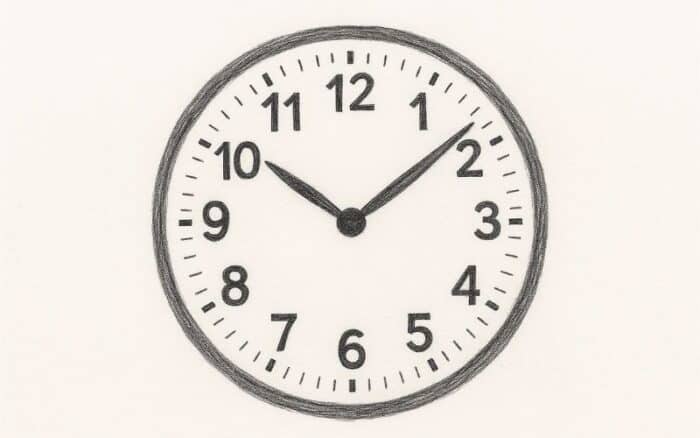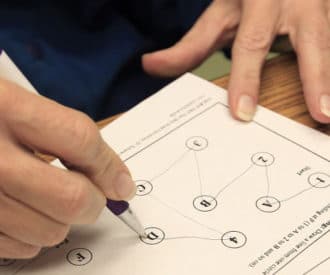The Mini-Mental Status Exam (MMSE) is a widely used 30-question screening tool that helps assess cognitive function in older adults, particularly for signs of dementia or Alzheimer’s Disease.
We examine the test and how it can help diagnose or rule out dementia.

Understanding the Mini-Mental Status Exam (MMSE) for Dementia Caregiving
Suppose you’re concerned because you think your older adult might be showing signs of Alzheimer's disease, dementia, or mild cognitive impairment. In that case, the first step is to visit their primary doctor for a complete check-up.
As a caregiver, familiarizing yourself with the Mini-Mental Status Exam (MMSE) can provide valuable insights into your loved one’s memory, orientation, language, and problem-solving abilities.
If there aren’t any apparent causes of dementia-like symptoms, such as a urinary tract infection or other treatable health conditions. In that case, many doctors will administer a cognitive screening test like the MMSE to check for possible mental issues.
Some people refer to this exam as “the clock drawing test.”
How the Mini-Mental Status Exam Works
The MMSE evaluates skills such as recalling words, following simple commands, and basic math (like counting backward by sevens).
Scoring ranges from 0 to 30, with lower scores indicating more significant cognitive decline (typically, a score below 24 suggests possible impairment). While the MMSE isn’t a definitive diagnostic tool, it helps doctors track changes over time and determine whether further neurological evaluation is needed.
Knowing what the test measures can help caregivers observe daily behaviors that align with, or contradict, the results. This allows for more informed discussions with healthcare providers.
The MMSE is commonly used because it only takes 5 – 10 minutes and doctors or nurses don’t need any equipment or special training.
This dementia test has 30 questions, each worth 1 point. It tests memory, orientation, and math skills.
The MMSE test includes questions that measure:
- Sense of date and time
- Sense of location
- Ability to remember a short list of common objects and later, repeat it back
- Attention and ability to do basic math, like counting backward from 100 by increments of 7
- Ability to name a couple of common objects
- Complex cognitive function, like asking someone to draw a clock
The grading scale is:
- 25 or more points = no cognitive impairment detected
- 21-24 points = mild cognitive impairment
- 10-20 points = moderate cognitive impairment
- 0-9 points = severe cognitive impairment
If someone scores in the 0 to 20 range on the MMSE, it can indicate cognitive impairment.
But it doesn’t mean that they have dementia. One cognitive screening test can't be used alone for diagnosing dementia.
This does mean that further evaluation is needed—more physical and cognitive tests should be conducted to understand better what is causing the mental issues.

The MMSE alone can’t be used for a dementia diagnosis
No matter what they score on the Mini Mental Status Exam, don’t consider those results the final answer.
Many factors can influence someone’s MMSE score, both positively and negatively. This is only one of many dementia diagnosis tools.
The MMSE is a useful cognitive screening tool, but it can’t be used to diagnose dementia or Alzheimer's disease because many factors could affect the test results.
Complicating factors include:
- Physical injuries
- Physical conditions like sleep apnea, which can cause memory or other cognitive problems
- Conditions like depression
- Trouble with math, especially for those with limited education
- Trouble with language, especially for non-native English speakers, those who don’t speak any English, and people with limited education
- Having a form of dementia that doesn’t significantly affect memory, like Lewy Body dementia

Experts Warn Against One-Time Memory Test Events
You may see memory screenings offered at shopping malls or health fairs.
Experts recommend avoiding those tests, even if they use the MMSE.
Taking a quick test like this without a complete medical evaluation isn’t an effective dementia screening and is more likely to cause unnecessary fear and worry.
Next Step Find out why the MMSE alone isn't enough for a dementia diagnosis
Recommended for you:
- How Is Dementia Diagnosed? A Geriatric Doctor Explains
- Signs of Alzheimer’s or Normal Forgetfulness?
- What Is Alzheimer’s Disease? Symptoms, Causes, Treatments
About the Author

Connie Chow
Connie was a hands-on caregiver for her grandmother for 20 years. (Grandma made it to 101 years old!) She knows how challenging, overwhelming, and all-consuming caring for an older adult can be. She also knows how important support is — especially in the form of practical solutions, valuable resources, and self-care tips.





If a person has repeatedly taken the test in the same conditions and the total score is the same (25+) but it is taking progressively longer for them to complete each time, exceeding 10 minutes, can this also be indicative of dementia?
Dementia can’t be diagnosed based only on a screening test. The doctor would need to do a thorough exam to rule out other potential causes if they suspect any cognitive issues.
Here’s more info on why a screening test doesn’t give enough info for a diagnosis – Testing for Dementia: The Mini Mental Status Exam Can’t Diagnose https://dailycaring.com/testing-for-dementia-why-the-mini-mental-status-exam-isnt-enough/
And here’s more info on what it takes to diagnose someone with dementia – How Is Dementia Diagnosed? A Geriatric Doctor Explains https://dailycaring.com/how-is-dementia-diagnosed-a-geriatrician-explains/
There should be a printable on this
The MMSE is a screening test that’s typically administered in a doctor’s office so they’re not available for people to take at home.
The Sage Test can be taken at home, but a doctor is needed to evaluate whether there’s a cognitive issue or not. More info here – SAGE Test: 15 Minute At-Home Test for Alzheimer’s https://dailycaring.com/sage-test-for-alzheimers-at-home/